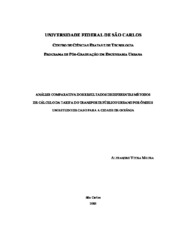Análise comparativa dos resultados de diferentes métodos de cálculo da tarifa do transporte público urbano por ônibus: um estudo de caso para a cidade de Gioânia.
Abstract
The demand for transit in the Brazilian s cities has declined considerably in the last years, not only due to
the low level of service but also due to high fares, that makes the ability of the low income users to afford
their trips very difficult. The high fares can be attributed to the rise of some items (fuel, tributes,
administrative expenses) and the lack of structure (human, material, tolls) to manage the fares. The
methodology currently used to estimate the fare values in the most Brazilian cities is obsolete, demanding
new calculation methods, that incorporates the new operation techniques and news legislations, which
have impact on the final price of bus-ticket. Considering this new management scenario, this dissertation
intends to compare the performance of 4 different methodologies to calculate transit fares (GEIPOT,
GOIÂNIA, AGR e DETESC) and to confront the results with the actual values adopted by the city transit
managers. This study of case it will have as base the used values of fuel, lubricant, wages and etc for the
calculation of the tariff of Goiânia.
